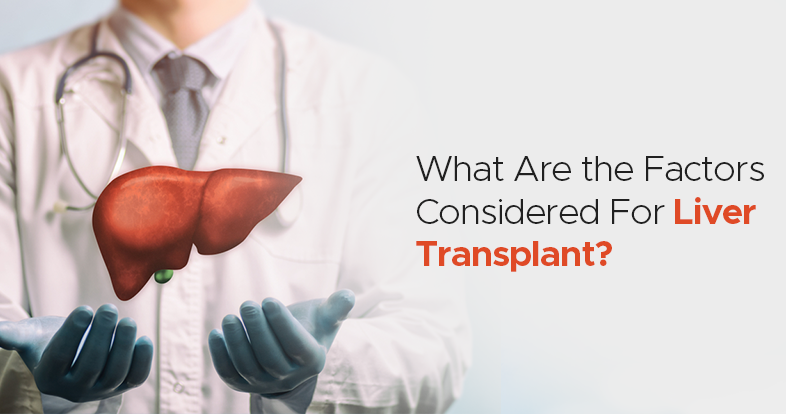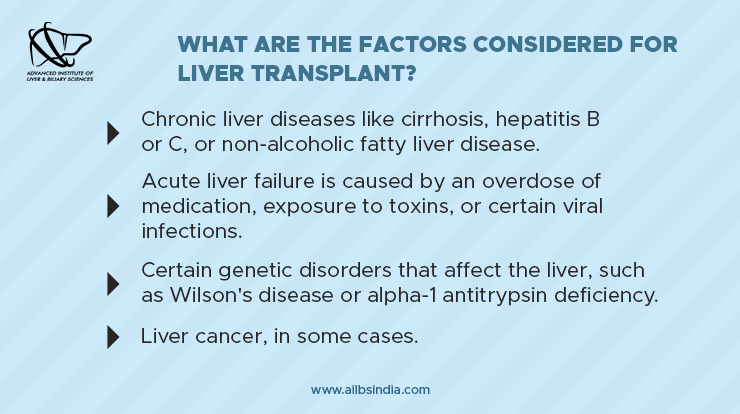
When it comes to organ transplants, the liver is one of the most commonly transplanted organs. A liver transplant is a surgical procedure that involves removing a diseased or damaged liver and replacing it with a healthy one. This procedure is often the last resort for patients suffering from end-stage liver disease or liver failure.
However, not everyone who needs a liver transplant can receive one immediately. There are several factors that doctors and transplant teams consider before placing a patient on the waiting list for a liver transplant. In this blog, let’s understand who needs a liver transplant, its symptoms, and much more to get better insights.
Liver diseases (if not treated on time) can lead to End-Stage Liver Diseases – which means the liver has lost almost 80-90% of its functionality. If you are diagnosed with an End-Stage Liver Disease, doctors suggest a liver transplant after proper evaluation of the patient’s condition.
The decision to undergo a liver transplant is not taken lightly. It is typically recommended for individuals whose liver has been severely damaged or is no longer functioning properly due to various reasons such as:

A liver transplant can treat a wide range of conditions that affect the liver’s ability to function properly. Some of the most common conditions that may require a liver transplant include:
Below are the factors that the best liver transplant doctor in India takes into consideration before giving a ‘GO AHEAD’ for a liver transplant:
After a patient meets the eligibility criteria of a liver transplant as set by a team of doctors and surgeons, he/she is listed on the national waiting list. (This is a list of patients waiting for a desired donor).
Every patient is given a score based on the Model of End-Stage Liver Disease (MELD) and Pediatric End-Stage Liver Disease (PELD) (in the case of children). Both MELD and PELD are based on blood test reports that consider the proper functioning of the liver’s ability to synthesize blood-clotting proteins. The patient with the higher score is given higher priority for a liver transplant. Regular blood tests are carried out to update the patient’s MELD Score and his/her subsequent position on the national waiting list.
A liver transplant is a life-saving procedure for individuals with end-stage liver disease or liver failure. However, the decision to proceed with a transplant is not taken lightly, and the transplant team carefully considers several factors. By understanding these factors, patients can better prepare themselves for the transplant process and increase their chances of a successful outcome.
If you are looking for the best doctor for liver transplant in India, Dr Vivek Vij is here to help you. He has 20+ years of experience in doing successful liver transplant surgeries that can give a new lease of life to patients. Book an appointment today to know more.
What is the main purpose of a liver transplant?
A liver transplant is a surgical procedure that involves replacing a diseased or damaged liver with a healthy liver from a donor. The main purpose of a liver transplant is to treat end-stage liver disease or liver failure, which can be caused by various conditions such as cirrhosis, hepatitis, liver cancer, or genetic disorders affecting the liver.
Who typically needs a liver transplant?
A liver transplant is typically recommended for individuals whose liver has been severely damaged or is no longer functioning properly due to chronic liver diseases like cirrhosis, hepatitis B or C, non-alcoholic fatty liver disease, acute liver failure caused by drug overdose or viral infections, certain genetic disorders like Wilson’s disease, or in some cases, liver cancer.
What factors do doctors consider before approving a liver transplant?
Some key factors that doctors and transplant teams consider before approving a liver transplant include the severity of liver damage, the presence of other medical conditions, a history of substance abuse, mental health, and the patient’s support system. They also consider the patient’s blood type and the availability of a suitable donor liver.
How are patients prioritized for a liver transplant?
Patients are prioritized for a liver transplant based on their Model for End-Stage Liver Disease (MELD) or Pediatric End-Stage Liver Disease (PELD) score, which is calculated based on blood tests that measure the liver’s functionality. Patients with higher MELD or PELD scores, indicating more severe liver damage, are given higher priority on the national waiting list for a liver transplant.


